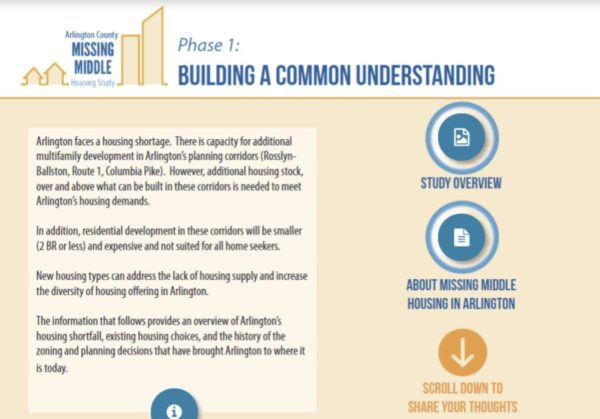 Making Room is a biweekly opinion column. The views expressed are solely the author’s.
Making Room is a biweekly opinion column. The views expressed are solely the author’s.
What are the consequences of Arlington’s housing shortfall?
What housing options are missing in Arlington’s neighborhoods?
What are the characteristics of your neighborhood that you most value?
These are some of the questions that Arlington County is asking as part of its Missing Middle Housing Study. And these seemingly innocuous questions are already generating heated opposition. In order to address Arlington’s housing shortage, we need to overcome the vitriol when it comes to talking about zoning.
“Missing Middle” housing, a phrase coined by Daniel Parolek, refers to small, multi-unit dwellings that allow multiple families to split the cost of land. Historically, duplexes, quadplexes, and rowhouses were common and legal to build in residential neighborhoods. Over the past century, zoning has restricted the types of housing allowed on most land – large apartment buildings in narrow corridors, detached single-family homes everywhere else.
Before Arlington staff make any recommendations about zoning ordinance or policy changes, they are charged with “building a common understanding” among County residents about the problem of housing affordability and distorted supply in Arlington.
If the rhetoric at public meetings, to say nothing of the comments section of this site, is any indication, we are a long way off from consensus about the health of Arlington’s housing market, the County’s capacity for more residents, or the impact of allowing more types of housing in more places.
The first step toward “common understanding” is a community survey that walks participants through data about the current state of Arlington’s housing market. The goal is to educate residents about the facts: our housing supply is constrained, and the types of housing are limited. At each point, participants can give feedback about their own experience and share what they see as the biggest impacts or concerns related to recent housing trends.
Some residents will be upset when confronted with the reality of our housing crisis and the history of Arlington’s development. Changes to zoning can seem like a threat to financial security and assumptions of what a residential neighborhood looks like. But for many people in Arlington, the current market is impossibly out of reach and new choices are the only way to gain a foothold in the County.
With such different perspectives on the impact of Arlington’s high housing costs, and the potential solutions, how is “common understanding” possible, to say nothing of a future consensus on policy solutions? We need to come together with our neighbors, share our experiences with housing, and talk about solutions with an open mind.
A model for this type of interaction can be found in the Livability 22202 initiative, organized by the three civic associations most impacted by the arrival of Amazon’s second headquarters in Pentagon City. Recognizing that growth and new development is coming to our neighborhood, the goal is to build consensus around “holistic strategies” that will address “common needs…enhance the physical and social health and well-being of all inhabitants and to strengthen community.”
The group recently released a report on housing, which draws on a year of citizen-led community engagement. As a resident of 22202, I had the opportunity to attend two Livability workshops about housing. The format encouraged skeptics to move beyond knee-jerk rejections against change and toward solutions that accept the reality of population growth in the County. We sat in small group comprised of renters and homeowners; long-term residents and new neighbors. We got presentations from experts and heard testimonials from local residents, and we also talked about our own values and experiences with housing. The result of these conversations is a document that captures a shared vision for housing in our community.
I hope the Missing Middle Study will create opportunities for Arlington residents to talk to each other. In the meantime, I encourage everyone who is concerned about housing affordability to take the Missing Middle Survey before it closes on December 31 (be sure to create an account so you can save your answers between sessions).
Jane Fiegen Green, an Arlington resident since 2015, proudly rents an apartment in Pentagon City with her family. By day, she is the Membership Director for Food and Water Watch, and by night she tries to navigate the Arlington Way. Opinions here are her own.


